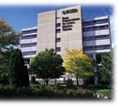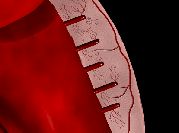Chicago Hospital Uses Non-surgical Channeling Device to Treat Heart Disease


Fred May is one of the first patients in the United States to undergo the catheterization procedure known as percutaneous myocardial channeling (PMC). PMC is designed to stimulate blood flow in the heart to relieve pain from angina by creating channels in the inner wall of the heart. Clinicians believe these channels promote the growth of new blood vessels (a process known as angiogenesis) to improve blood supply to heart tissues.
Gary Schaer, M.D., director of the cardiac catheterization laboratory at the Rush Heart Institute and Jeffrey Snell, M.D., interventional cardiologist, performed the procedure as part of a Phase I clinical trial to determine the procedure's safety. Rush is one of five U.S. hospitals participating in the trial. May is the fourth patient treated in the clinical trial at Rush. As part of this Phase I study, Rush will treat six patients.
Myocardial channeling, developed by AngioTrax Inc. (Sunnyvale, CA), involves threading a catheter with a rotating surgical blade attached at the end through the patient's femoral artery.

While guided by an angiographic mapping technique, the cardiologist uses the device to create 15 to 20 channels in the heart muscle. The entire procedure takes approximately 90 minutes, can be done under local anesthesia and does not involve surgery. Most patients will go home the next day and some may eventually be discharged the day of the procedure, according to Schaer. This contrasts with a four to five day hospital stay for surgery.
Rush has developed special expertise in treating end-stage coronary artery disease. In 1995, Rush participated in a clinical trial on transmyocardial revascularization. Last year, Rush was among the handful of hospitals to begin using gene therapy injections for heart disease.
"If successful, myocardial channeling will add to our repertoire of therapies we can offer patients who are suffering from severe chest pain," Schaer said. One added benefit of AngioTrax's device is that the cardiologist can preserve samples of the heart tissue for further study, he noted.
Each year, approximately 80,000 Americans develop severe coronary artery disease that cannot be treated by conventional techniques, including bypass surgery or angioplasty. More than 7 million suffer from chest pain due to coronary artery disease.
Rush-Presbyterian-St. Luke's Medical Center includes the 809-bed Presbyterian-St. Luke's Hospital, which serves as the tertiary hub of the Rush System for Health, an integrated delivery network of eight hospitals and multiple outpatient facilities.
For more information on percutaneous myocardial channeling or transmyocardial channeling, visit AngioTrax's Web site at www.angiotrax.com. For more information on Rush-Presbyterian-St. Luke's Medical Center, visit the hospital's Web site at www.rpslmc.edu.
Edited by Rick Dana Barlow
